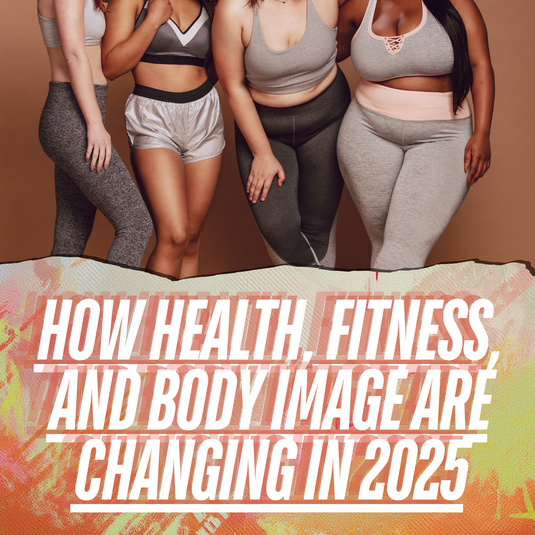How Health, Fitness, and Body Image Are Changing in 2025

⏱️ Estimated Read Time: 6 minutes
TL;DR
How Health, Fitness, and Body Image Are Changing in 2025 offers effective, accessible movements for targeted results.
This guide is designed to help you move smarter, build strength, and stay consistent.
Summary
This post explores how health, fitness, and body image are changing in 2025 in a way that’s actionable and easy to follow. Whether you're new to this style of training or leveling up, it includes practical takeaways for your routine.
Table of Contents
The way we think about weight, body image, and fitness is changing dramatically in 2025. More people are prioritizing mindful health and well-being over extreme dieting or seasonal fitness goals. From medications like Ozempic to the anti-diet movement and body neutrality, the health revolution is redefining what it means to be fit—and feel good. In this article, we’ll explore the biggest shifts in weight management, fitness culture, and body image and why they matter more than ever.
Want to build strength and confidence at home? Explore our expert-designed workout programs or browse dumbbells and recovery tools to get started today.
Key Takeaways
- People are prioritizing sustainable wellness over seasonal appearance goals.
- Medications like Ozempic are reframing how we treat obesity.
- The anti-diet and intuitive eating movements promote mental and emotional well-being.
- Fitness now focuses on strength, mobility, and enjoyment—not just looks.
- Success is redefined by energy, mood, and function—not weight alone.
The Big Shift in Body Image and Weight Management
For decades, thinness was equated with health. That mindset is being replaced by a more inclusive, realistic, and empowering view of what healthy looks and feels like. Here's what’s changing and why it matters.
1. The End of the “Summer Body” Hype
Spring used to bring pressure to diet hard and slim down for summer. Many people would begin extreme routines—restrictive diets, intense cardio workouts, and juice cleanses—in the name of looking good for a short season. Today, more people are shifting toward sustainable health habits they can maintain year-round. Movement, sleep, rest, and whole foods are taking the spotlight over crash diets and burnout workouts.
This means more individuals are walking regularly, embracing bodyweight workouts at home, and focusing on functional movement rather than aesthetics. Nutritionally, there's less obsession over calorie counts and more attention to nourishing meals that support energy and mood. Emotional wellness is also prioritized, with many incorporating mindfulness, stress reduction, and adequate sleep into their health routines.
Why it matters: This mindset reduces health risks associated with extreme weight fluctuations and helps people build long-term routines that support both mental and physical well-being.
2. Ozempic, Wegovy, and the Rise of GLP-1 Medications
Ozempic and Wegovy are GLP-1 receptor agonists originally prescribed for diabetes but now gaining popularity for weight management. These medications help regulate appetite and blood sugar—under medical supervision. They work by mimicking a hormone called GLP-1 that helps reduce hunger and increase feelings of fullness.
What makes this important is how it reflects a medical shift. Obesity is being recognized not as a result of laziness or lack of willpower, but as a complex condition influenced by hormones, genetics, environment, and lifestyle. Medications like these are not a magic solution but can help individuals with long-standing struggles finally gain traction when combined with behavior change and medical oversight.
Why it matters: Obesity is increasingly being treated as a medical condition, not a character flaw. Medications are seen as tools—not solutions—to complement lifestyle changes. They’re not for everyone, but they’ve started an important conversation around inclusive healthcare.
3. The Anti-Diet Movement Goes Mainstream
Diet culture is being replaced by approaches focused on mental health, emotional well-being, and trusting your body. People are asking: “How do I feel?” instead of “What do I weigh?”
- Intuitive Eating: Eat when you're hungry, stop when full. This approach encourages people to listen to internal cues rather than external rules or meal plans.
- Body Neutrality: Respect your body for what it can do, not how it looks.
- Mental Health First: Understand how food, exercise, and emotions are interconnected.
This isn’t about abandoning health—it's about redefining it. People are embracing slow, consistent habits over short-term weight loss tactics and letting go of guilt around food. Wellness is now about nourishment, not punishment.
Why it matters: This reduces cycles of guilt, shame, and unrealistic expectations—leading to healthier and more compassionate relationships with food and self-image.
4. Fitness Is About Strength, Not Just Looks
Fitness is no longer about shrinking your body. The new focus? Building strength, flexibility, and enjoyment. Movement is being reframed as a way to improve quality of life, boost mood, and reduce risk of chronic illness—not just to fit into smaller clothes.
- Strength training—especially among women—is on the rise.
- Activities like walking, dancing, swimming, and yoga are favored for sustainability.
- Recovery tools like foam rolling, mobility drills, and breathwork are becoming essential.
Fitness is also becoming more adaptive and inclusive, with options for different body types, abilities, and schedules. Online fitness communities, virtual training programs, and accessible equipment are making it easier for anyone to start moving.
Why it matters: These shifts make fitness more inclusive and accessible—no gym intimidation required.
5. Social Media: Help or Harm?
Platforms like TikTok and Instagram can fuel harmful body standards—but they’re also creating space for body diversity and real talk. For every airbrushed influencer, there’s someone keeping it real—and that's helping users reconnect with reality.
- More people share unfiltered images—stretch marks, bloating, and all.
- Professionals share tips backed by credentials (not filters).
- Authentic stories help normalize mental and physical health journeys.
Why it matters: With the right sources, social media can educate, empower, and normalize diverse health experiences.
6. New Definitions of Success
If not pounds or pant size, what defines progress? For many, success now looks like:
- Waking up energized and well-rested
- Feeling less anxious or overwhelmed
- Gaining strength, flexibility, and balance
- Having more mental clarity and focus
- Making peace with food and body image
- Enjoying movement without pressure or punishment
Why it matters: Health is now measured by how you feel—not how you look. This change supports long-term mental and physical wellness.
7. Concerns and Cultural Pushback
Not everyone is on board. There are valid concerns around medication misuse, the commercialization of body positivity, and downplaying real health risks. Critics of the anti-diet movement argue that rejecting structure can make it hard for some people to maintain healthy routines. Meanwhile, others are concerned about the rising popularity of weight-loss medications without adequate education or follow-up.
Why it matters: These critiques emphasize the need for balance. Health isn’t about extremes—it’s about honoring individual needs with informed, compassionate choices. Thoughtful discussion helps keep wellness inclusive, ethical, and effective.
Final Thoughts: The Health Revolution We Needed
We’re finally breaking free from outdated health ideals. Whether you’re using medication, trying strength training, or simply eating more mindfully, you’re part of a broader shift: health is personal, not prescriptive.
There’s no one-size-fits-all answer anymore—and that’s the best news of all.
FAQs
What is the anti-diet movement?
The anti-diet movement challenges traditional dieting culture. It promotes intuitive eating, mental well-being, and body respect rather than calorie counting and restrictive eating.
What is Ozempic used for?
Ozempic is a GLP-1 receptor agonist originally used to manage type 2 diabetes. It is now also prescribed for weight loss under medical supervision.
What does body neutrality mean?
Body neutrality is the concept of respecting your body for what it can do instead of focusing on appearance. It encourages self-acceptance at all sizes.
What are signs of progress besides weight loss?
Signs include better sleep, improved mood, increased strength, better digestion, and a healthier relationship with food and exercise.
Is strength training only for athletes?
No. Strength training is beneficial for all fitness levels. It helps improve bone health, metabolism, and overall strength, regardless of your size or athletic ability.
Want more guidance? Check out our Weekly Dumbbell Workout #1.
📝 FAQs
How often should I do these exercises? +
2–3 times per week is a good starting point for most people.
Do I need equipment? +
Many of these can be done with just your bodyweight or a single kettlebell or dumbbell.
Can beginners do these routines? +
Yes! These movements are designed to scale with your fitness level.










